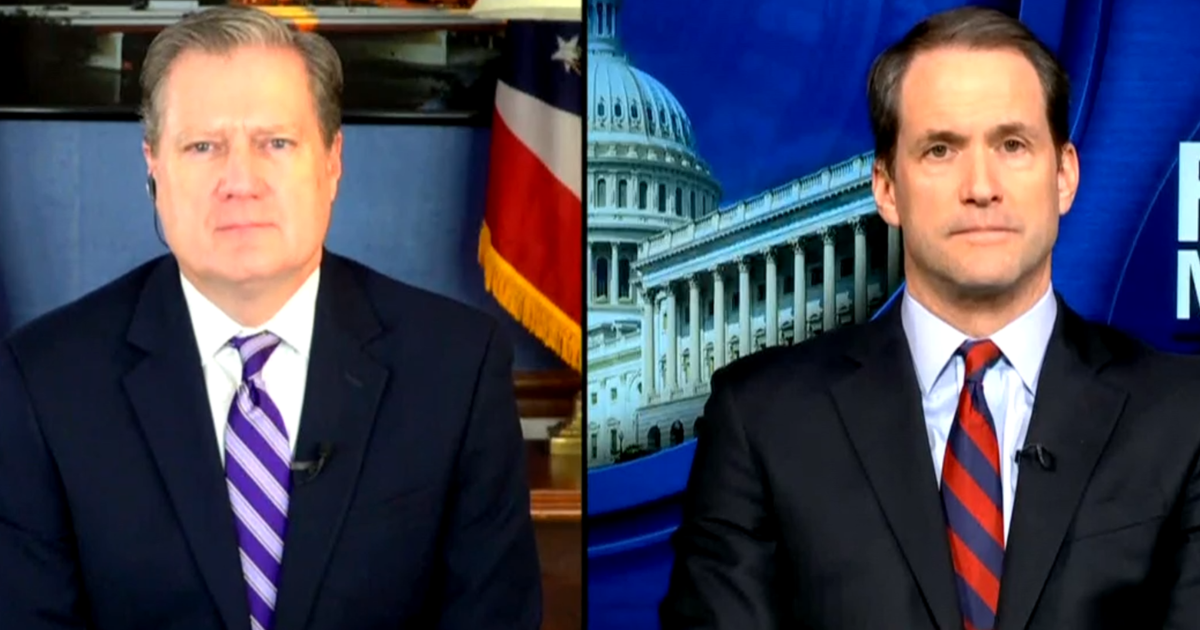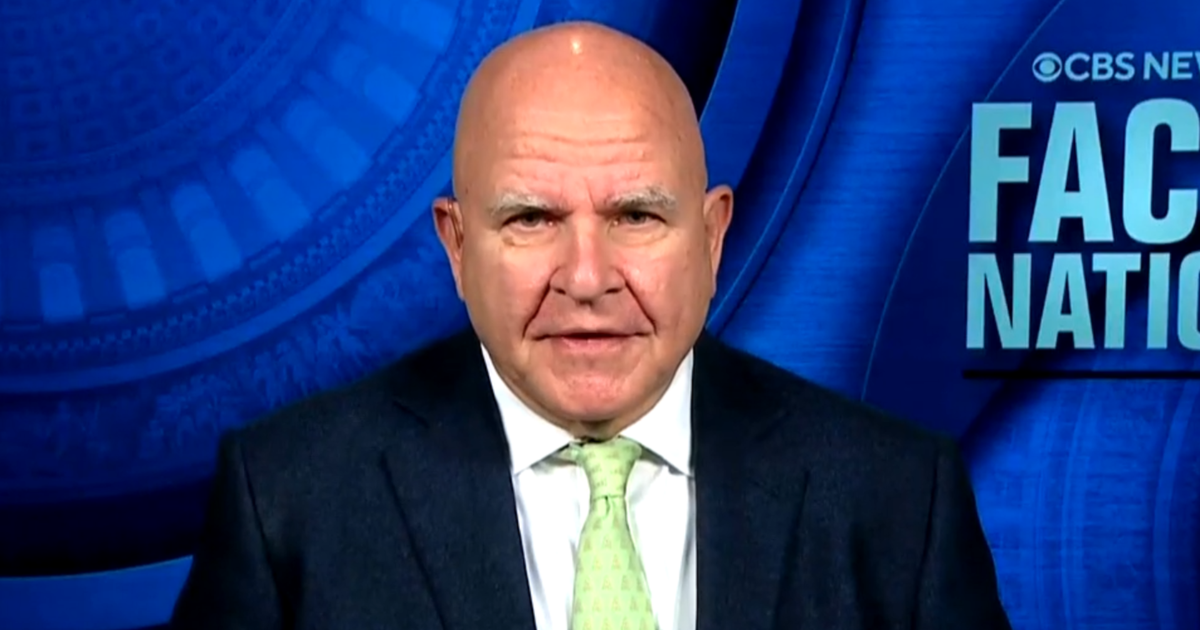CBS News
Transcript: House Intelligence Committee chair Rep. Mike Turner and Rep. Jim Himes on “Face the Nation,” Feb. 4, 2024

The following is a transcript of an interview with House Intelligence Committee chair Rep. Mike Turner, Republican of Ohio, and Rep. Jim Himes, Democrat of Connecticut, that aired on Feb. 4, 2024.
MARGARET BRENNAN: We turn now to the leaders of the House Intelligence Committee Republican Mike Turner who’s in Dayton, Ohio this morning and Democrat Jim Himes, who’s in Stamford, Connecticut. Welcome to you both.
REP. MIKE TURNER: Thanks. Thank you for having us.
MARGARET BRENNAN: Chair Turner, the Speaker of the House criticized the Biden administration for public hand wringing excessive signaling ahead of these strikes, saying that it undercuts the US ability to put a stop to the attacks. Do you accept the explanation that you heard from Jake Sullivan, the National Security Adviser?
REP. MIKE TURNER: Alright- so, Margaret I think that they have confusion among their goals and objectives. They keep shifting as to what they’re trying to achieve with the attacks and really what their policy is, with respect to response, you know, that Secretary Austin, the Secretary Defense, said that when Americans are attacked, we will respond. However, that’s not true. They’ve tolerated over 160 of these attacks–
MARGARET BRENNAN: — They’ve been out carrying strikes on–
REP. MIKE TURNER: — Well, certainly — Well in minor areas, nothing to actually counter what is occurring here. And that’s the issue. But you also heard with Jake Sullivan, then he said, when- when there are attacks or deaths of American service members, we will respond. He was- he was coupling it to both, which is what they’ve done here. But this is a problem, Margaret, they keep saying that they want to, you know, retaliate, but then they say it’s about deterrence, then they say it’s about diminishing capabilities. Those are all different goals and objectives. And they’re not doing any of those. We all know that this is just about Iran. These are all franchises of Iran. And the administration has no policy with respect to Iran, how to diminish their capability, diminish these attacks and diminish their nefarious activities in the Middle East.
MARGARET BRENNAN: Congressman Himes, how do you respond to that? And I know you have said that you hoped these strikes would cause significant pain to the Iranian Revolutionary Guard Corps. Jake Sullivan says they still don’t know. If they were able to take out any personnel from the IRGC?
REP. JIM HIMES: Yeah, yeah. Look, Margaret, you know, I respectfully disagree with Chairman Turner. What needs to happen here is exceedingly clear; there are two things that must happen. Number one, we must make it very clear to the Iranian and to the Iranian backed militias, that attacks on US troops, on US assets will be enormously expensive. Enormously expensive. And I think we are in the process of doing that. And number two, the other objective, of course, is we don’t want to go to war with Iran. That, by the way, is an objective that Iran shares, they don’t want to go to war with us. So there is a certain amount of ambiguity in this. And what you do is you listen to what the other side’s red lines are. The Iranians I think would regard for example, an attack on their territory- territory, certainly the killing of civilians inside Iran as a red line that they would then be forced to react to. The chairman was just not right when he said that they hadn’t responded, that the administration hadn’t responded to the many, many attacks. The 160 attacks. Those attacks were proportional. The Iranians, in a dark way, got lucky in- in their ability in Tower 22, to take out three Americans. That obviously requires a much more dramatic response than the earlier attacks in which we didn’t suffer casualties. And that, of course, is what their militias in Iraq- in Syria and Iraq have experienced over the course of the- of the last 24 hours and will continue to experience I think, for the next couple of days.
MARGARET BRENNAN: I think you’re referring to the strikes on like January, I think it was January 3 or January 24. That were militia- militia people targeted by the United States, but not the kind of B-1 bomber mission we just saw carried out on Friday. Chair Turner–
REP. JIM HIMES: — That’s right. The B-1s come out when- when Americans are killed. When they’re not killed the response is obviously going to be less dramatic.
MARGARET BRENNAN: Right. But- but to the point it hasn’t deterred the continued tit-for-tat attacks, which, by the way, Chair Turner, you acknowledge those those were going on before October 7. Those have been for some time–
REP. MIKE TURNER: — They’ve been going on for some time, and this- this administration has- has responded incredibly poorly. You know, one is a result of the other. If you tolerate attacks, you are going to tolerate that you’re going to have casualties. And the problem here is that the administration, back to goals and objectives, has no goal and objective. Iran pays no price when militias are attacked; the militias don’t care. And when you diminish their capability for the- the moment that you’ve struck them, you haven’t diminished their overall capability, these attacks are still going to happen. The administration needs two things: a real plan with respect to Iran and countering Iran in the area. But secondly, diminishing capacity to stop these attacks. We can’t play defense forever. Our systems to protect our troops and our ships cannot continue to respond to these attacks with 100% success. Tolerating the attacks, tolerates casualties. We need to diminish their capability and we need to take this problem to Iran.
MARGARET BRENNAN: Let me ask you, Congressman Turner, Speaker Johnson said he’s putting forward a standalone Israel security bill for about $17.5 billion. You only have 219 Republicans in the House and one of them has already said he’s not on board with this. This does not look like it has an easy path forward. What does this do to complicate all the other significant national security priorities that I know you support, like Ukraine? Isn’t this just a political statement?
REP. MIKE TURNER: Well, I’m very concerned about- about that strategy. I was very concerned when we did it last year, and they brought up a Israel bill that was paid for. This one, importantly, does not have paid for. I think that we really have four significant national security threats. We have Asia, we have Ukraine, we have Israel and what’s going on in the Middle East. And of course, we have our border. And right now we’ve been proceeding on negotiations on those four. Ukraine has to be funded. It has- we have to respond to Russian aggression, or we will have a broader war there. And also, the- the atrocities that Russia has been undertaking in Ukraine need to be responded to. Of course, we have to respond and support Israel. And again, back to our activities in the area, we need to make certain that we’re responding to the nefarious actions of Iran in the region. So I do think that all these are coupled.
MARGARET BRENNAN: And so that- that would suggest you don’t like the standalone bill strategy?
Rep. Mike Turner: I’m- I’m very concerned about this process. Now, the–
MARGARET BRENNAN: — Yes–
REP. MIKE TURNER: The speaker has said openly that he fully supports the funding for Ukraine, we have to make certain that there is a path to- to do that–
MARGARET BRENNAN: Yeah
REP. MIKE TURNER: The Ukrainians are getting to the point where it’s critical that the funding come through. And I certainly am looking forward to the- the speaker describing if he’s going to piecemeal this, how each of these pieces get–
MARGARET BRENNAN: Yeah–
REP. MIKE TURNER: –Accomplished.
MARGARET BRENNAN: And Congressman Himes, Democrats may end up having to essentially deliver the votes to allow that to pass. I know you have said on another network, referencing these very- this very thin majority that the Republicans have and threats by some of the Republican members to oust the Speaker. You’ve linked his survival to whether he works with Democrats to pass Ukraine aid. Are Democrats offering Johnson protection here from his own party?
REP. JIM HIMES: Well, the move he has taken to offer an Israel only deal is very dirty pool. It’s an act of staggering bad faith. Why do I say that? Because and- and- and Mike and I were in the situation room when the brand new Speaker laid out for the national security adviser. The way we’re going to do this is we’re going to do a border deal as a condition to doing Ukraine aid. And then we’ll do, you know, we’ll- it’ll be a package with Ukraine, with Israel money, and with Indo-PACOM money that’s for- for- for East Asia. Before the wording of a bipartisan border deal was even available to anybody, at a time in which Mitch McConnell was saying we will never get a border deal that is better than this one, Mike and I both heard him say that in the cabinet room, the Speaker said it’s dead on arrival, it will not happen. So I don’t have quite Mike’s optimism here. I think what’s happening here is that the Speaker is taking a move to get Israel aid done, which we all support, most of us support, I shouldn’t say all. But that will allow him to ultimately not do a border deal because there are Republicans, Mike Turner not amongst them, who would rather that problem be an issue in November and that it not be solved and there are roughly 50%, we know this from the votes, of Republicans who oppose Ukraine aid. So as much as it is important for us to provide aid to Israel, this is the first step in getting aid to Israel at the expense of any aid to Ukraine and at the expense of a generally- a generational opportunity to actually get a border immigration deal done.
MARGARET BRENNAN: So your offer essentially to protect Speaker Johnson from a motion to vacate is off the table?
REP. JIM HIMES: Well, no. Let’s- step- step back to that question. First of all, I didn’t offer to protect the Speaker. I made the point in the cabinet room that we were all agreeing on the importance of Ukraine aid and the importance of a good border deal. The President said he will shut down the border, he will do a big deal. So the challenge becomes how do we position the two congressional leaders who matter in the House, Hakeem Jeffries and Speaker Johnson, who I pointed out was in a very precarious position–
MARGARET BRENNAN: –Yes
REP. JIM HIMES: — How do we position them to get to yes? And the reality is that with a whatever two vote majority anything that gets done in the House of Representatives, anything will get done with some Democratic help. So how do we tee up the position to move forward in a bipartisan way? And here’s the challenge for the Speaker, any bipartisan activity, certainly activity that requires a lot of Democrats puts him in great peril. And, of course, he thinks about that.
MARGARET BRENNAN: Right. Chair Turner, you called the border the most significant present national security threat in previous interviews.
REP. MIKE TURNER: Yes.
MARGARET BRENNAN: I know you haven’t seen the text, but you just heard Senator Sinema lay out in great detail what she has helped put together. Did you like what you heard?
REP. MIKE TURNER: Well, I think- I think those are certainly important elements. And we do have to, I mean, in any instance, we have to- to see the bill. And I just want to compliment Jim Himes one more time, you know, we work on a very bipartisan basis and despite our disagreements on the administration’s policy. But you heard him say, this is really a very difficult process to get all of this done. Over 300 members have always voted for these- these funding packages. Everyone recognizes these are national security threats. And we need to find a path to get these done. Now on the border, you know, FBI Director Wray has said that we have the highest threat right now for the possibility of a terrorist attack on US soil as a result of the open border and the people who have come into the United States. We don’t know where they are, some of which who have allegiance to international terrorist groups and organizations that the- the FBI director himself has said that. I think that- you know that certainly should be part of the impetus for everyone to look to, how do we resolve this issue.
MARGARET BRENNAN: In other words, you can’t wait for the election to be over. There should be a bill voted on, and you’re open to voting for this one.
REP. MIKE TURNER: Yes, I mean, absolutely. This is an issue that needs to be addressed now. And I look forward to reading the text and seeing what’s- what’s in the bill. And this certainly is one of the highest priorities.
MARGARET BRENNAN: And Congressman Himes, there are some congressional Democrats, including from the Hispanic Caucus who are already complaining about this, even though the text is not out. Do you think Democrats will ultimately come out to support this bill the White House negotiated?
REP. JIM HIMES: I do, Margaret. And- and you’re exactly right. And I’ve- I’ve- I’ve heard- you know, we have a general sense of what’s in the bill. And yes, there is dramatic concern in the let’s call it the progressive wing of the Democratic Party. But the President has said, and Mike and I heard this three times in the cabinet room that he will go big. It is clear on a bipartisan basis. If you have eyes, you understand that we have a crisis at the southern border, and it needs to be fixed. And so the challenge here is and, I go back to what I told you previously, how do we put the two leaders in a position to do a very hard thing because immigration border deals are very hard. There’s a reason we haven’t done one in 40 or 50 years. They’re very, very hard. And again, I’m not looking necessarily to protect Mike Johnson. But Mike Johnson is a very precariously situated Speaker of the House. And so the question is, how do we get instincts like Mike Turner’s to prevail in the Republican Party? And how do we get enough Democratic votes on- on- on the left to make sure that we take advantage of this truly generational opportunity? Again, don’t listen to me about this. Mitch McConnell, in the cabinet room said if we had Donald Trump as president, a Republican Senate and a Republican House, we would not get this deal.
MARGARET BRENNAN: Right.
REP. JIM HIMES: So my hope is that the two parties can come together to get it done.
MARGARET BRENNAN: Well, we will see and gentlemen, we appreciate you speaking in this bipartisan fashion and joining us both today. We’ll be right back.
CBS News
Former Israeli hostages released in truce 1 year ago call for action to release those still held

Former Israeli hostages who were freed from Hamas captivity during a week-long humanitarian pause in fighting exactly one year ago Sunday called for immediate action to secure a deal for the release of those still held.
The only truce in the ongoing Israel-Hamas war on Nov. 24, 2023 – fewer than two months after fighting began – led to the release of 80 Israelis held by militants in Gaza. They were freed in exchange for 240 Palestinians detained in Israeli jails.
Repeated efforts since then by mediators from Qatar, Egypt and the United States to secure another truce and hostage release have failed. Qatar early this month said it was suspending its mediation role until the warring sides show “seriousness.”
Mostafa Alkharouf/Anadolu via Getty Images
Gabriella Leimberg was kidnapped during the Oct. 7, 2023, Hamas attack and was released along with her daughter, Mia, and sister Clara.
“For 53 days, the one thing that kept me going is that we, the people of Israel, the Jewish people, sanctify life — we don’t leave anyone behind,” she said.
Leimberg added: “Everything has already been said and now action is required. We don’t have any more time.”
Around 100 hostages are still in Gaza, and at least a third are believed to be dead.
“I survived and I was fortunate to get my entire family back,” Leimberg said. “I want and demand this for all the families of the hostages.”
Hamas wants Israel to end the war and withdraw all troops from Gaza. Israel has offered only to pause its offensive.
The Palestinian death toll from the war surpassed 44,000 this week, according to Gaza’s Health Ministry, which does not distinguish between civilians and combatants in its count.
Maya Alleruzzo / AP
Danielle Aloni, who was kidnapped with her five-year-old daughter, Emelia, and freed after 49 days, spoke at the ceremony of the “increasing danger” those still being held face every day.
She said those still in captivity “suffer physical, sexual, and psychological abuse, their identity and dignity crushed anew each day”.
“It took the Israeli government about two months to secure a deal for me and 80 other Israeli hostages. Why is it taking over a year to reach another deal to free them from this hell?” asked Aloni, whose brother-in-law, David Cunio, and his brother, Ariel Cunio, are still being held.
She emphasized that, even though she and the other hostages gained their freedom a year ago, “we haven’t really left the tunnels,” — referring to Hamas’ underground tunnels where many of the hostages were held.
“The feeling of suffocation, the terrible humidity, the stench — these sensations still envelop us,” Aloni said.
“If people could truly understand what it means to be held in subhuman conditions in tunnels, surrounded by terrorists for 54 days — there’s no way they would allow hostages to remain there for 415 days!” said Raz Ben Ami, who was released in the deal a year ago.
Her husband, Ohad, is still among those being held.
Ben Ami called for a ceasefire to “bring back all the hostages as quickly as possible”.
CBS News
Couple charged for allegedly stealing $1 million from Lululemon in convoluted retail theft scheme

A couple from Connecticut faces charges for allegedly taking part in an intricate retail theft operation targeting the apparel company Lululemon that may have amounted to $1 million worth of stolen items, according to a criminal complaint.
The couple, Jadion Anthony Richards, 44, and Akwele Nickeisha Lawes-Richards, 45, were arrested Nov. 14 in Woodbury, Minnesota, a suburb of Minneapolis-St. Paul. Richards and Lawes-Richards have been charged with one count each of organized retail theft, which is a felony, the Ramsey County Attorney’s Office said. They are from Danbury, Connecticut.
The alleged operation impacted Lululemon stores in multiple states, including Minnesota.
“Because of the outstanding work of the Roseville Police investigators — including their new Retail Crime Unit — as well as other law enforcement agencies, these individuals accused of this massive retail theft operation have been caught,” a spokesperson for the attorney’s office said in a statement on Nov. 18. “We will do everything in our power to hold these defendants accountable and continue to work with our law enforcement partners and retail merchants to put a stop to retail theft in our community.”
Both Richards and Lawes-Richards have posted bond as of Sunday and agreed to the terms of a court-ordered conditional release, according to the county attorney. For Richards, the court had set bail at $100,000 with conditional release, including weekly check-ins, or $600,000 with unconditional release. For Lawes-Richards, bail was set at $30,000 with conditional release and weekly check-ins or $200,000 with unconditional release. They are scheduled to appear again in court Dec. 16.
Prosecutors had asked for $1 million bond to be placed on each half of the couple, the attorney’s office said.
Richards and Lawes-Richards are accused by authorities of orchestrating a convoluted retail theft scheme that dates back to at least September. Their joint arrests came one day after the couple allegedly set off store alarms while trying to leave a Lululemon in Roseville, Minnesota, and an organized retail crime investigator, identified in charging documents by the initials R.P., recognized them.
The couple were allowed to leave the Roseville store. But the investigator later told an officer who responded to the incident that Richards and Lawes-Richards were seasoned shoplifters, who apparently stole close to $5,000 worth of Lululemon items just that day and were potentially “responsible for hundreds of thousands of dollars in loss to the store across the country,” according to the complaint. That number was eventually estimated by an investigator for the brand to be even higher, with the criminal complaint placing it at as much as $1 million.
Richards and Lawes-Richards allegedly involved other individuals in their shoplifting pursuits, but none were identified by name in the complaint. Authorities said they were able to successfully pull off the thefts by distracting store employees and later committing fraudulent returns with the stolen items at different Lululemon stores.
“Between October 29, 2024 and October 30, 2024, RP documented eight theft incidents in Colorado involving Richards and Lawes-Richards and an unidentified woman,” authorities wrote in the complaint, describing an example of how the operation would allegedly unfold.
“The group worked together using specific organized retail crime tactics such as blocking and distraction of associates to commit large thefts,” the complaint said. “They selected coats and jackets and held them up as if they were looking at them in a manner that blocked the view of staff and other guests while they selected and concealed items. They removed security sensors using a tool of some sort at multiple stores.”
CBS News contacted Lululemon for comment but did not receive an immediate reply.
CBS News
Former Trump national security adviser says next couple months are “really critical” for Ukraine

Washington — Lt. Gen. H.R. McMaster, a former national security adviser to Donald Trump, said Sunday that the upcoming months will be “really critical” in determining the “next phase” of the war in Ukraine as the president-elect is expected to work to force a negotiated settlement when he enters office.
McMaster, a CBS News contributor, said on “Face the Nation with Margaret Brennan” that Russia and Ukraine are both incentivized to make “as many gains on the battlefield as they can before the new Trump administration comes in” as the two countries seek leverage in negotiations.
With an eye toward strengthening Ukraine’s standing before President-elect Donald Trump returns to office in the new year, the Biden administration agreed in recent days to provide anti-personnel land mines for use, while lifting restrictions on Ukraine’s use of U.S.-made longer range missiles to strike within Russian territory. The moves come as Ukraine marked more than 1,000 days since Russia’s invasion in February 2022.
Meanwhile, many of Trump’s key selection for top posts in his administration — Rep. Mike Waltz for national security adviser and Sens. Marco Rubio for secretary of state and JD Vance for Vice President — haven’t been supportive of providing continued assistance to Ukraine, or have advocated for a negotiated end to the war.
CBS News
McMaster said the dynamic is “a real problem” and delivers a “psychological blow to the Ukrainians.”
“Ukrainians are struggling to generate the manpower that they need and to sustain their defensive efforts, and it’s important that they get the weapons they need and the training that they need, but also they have to have the confidence that they can prevail,” he said. “And any sort of messages that we might reduce our aid are quite damaging to them from a moral perspective.”
McMaster said he’s hopeful that Trump’s picks, and the president-elect himself, will “begin to see the quite obvious connections between the war in Ukraine and this axis of aggressors that are doing everything they can to tear down the existing international order.” He cited the North Korean soldiers fighting on European soil in the first major war in Europe since World War II, the efforts China is taking to “sustain Russia’s war-making machine,” and the drones and missiles Iran has provided as part of the broader picture.
“So I think what’s happened is so many people have taken such a myopic view of Ukraine, and they’ve misunderstood Putin’s intentions and how consequential the war is to our interests across the world,” McMaster said.
On Trump’s selections for top national security and defense posts, McMaster stressed the importance of the Senate’s advice and consent role in making sure “the best people are in those positions.”
McMaster outlined that based on his experience, Trump listens to advice and learns from those around him. And he argued that the nominees for director of national intelligence and defense secretary should be asked key questions like how they will “reconcile peace through strength,” and what they think “motivates, drives and constrains” Russian President Vladimir Putin.
Trump has tapped former Rep. Tulsi Gabbard to be director of national intelligence, who has been criticized for her views on Russia and other U.S. adversaries. McMaster said Sunday that Gabbard has a “fundamental misunderstanding” about what motivates Putin.
More broadly, McMaster said he “can’t understand” the Republicans who “tend to parrot Vladimir Putin’s talking points,” saying “they’ve got to disabuse themselves of this strange affection for Vladimir Putin.”
Meanwhile, when asked about Trump’s recent selection of Sebastian Gorka as senior director for counterterrorism and deputy assistant to the president, McMaster said he doesn’t think Gorka is a good person to advise the president-elect on national security. But he noted that “the president, others who are working with him, will probably determine that pretty quickly.”







